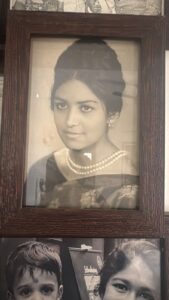1965 Kanpur India
Ramandeep Kalra
1952
Kanpur, India
Interviewed on 6th February 2025
by Keya Gupta

With a certain nostalgic look on her face, Gigi described to me how her childhood Sundays often meant going swimming at the National Stadium in Kanpur, India, with her family. Afterwards, they would very occasionally go to the NSCI club, of which her father was a member, whenever there were films screened there. Films, to her, were a big communal activity; it didn’t necessarily mean going to the theater and watching films—in fact, that was a rare occurrence—but meant gathering in front of huge screens placed in the garden at the neighborhood gymkhana or crowding around the radio with her siblings, eagerly listening to the latest soundtracks of Bollywood movies, one released every Friday. Gigi laughed as she said how she and her sister used to dance around in dupattas, singing the songs at the top of their lungs, playing games on deciphering the plot of the movie from the soundtrack.
While Gigi doesn’t remember watching her first film, she said if she simply had to recall a favourite memory, it would be going to the theatre for her friend’s thirteenth birthday. She remembers they went for the 12 pm show, and her friend bought the tickets for just 1 rupee each (about $0.011). The movie was Jab Jab Phool Khile, starring Shashi Kapoor and Nanda, at the Sapru Theatre in Kanpur. “The song went like Nameeda na naam nameeda nam nameeda nam,” she laughed, “and then I’d go around singing that for days.” Growing up, Gigi’s family didn’t have much money, and going to Sapru Theatre was considered an extravagant treat. She would never dare ask her parents to take her unless they were in the mood to treat them, which would maybe be me once a year. Instead, her family spent time together doing simple activities, like oiling their hair or playing board games. That’s what made going to the movies so special. She would savor the one piece of the four-piece chocolate bar that would be split evenly between her siblings and her from the concession stand.
Gigi believes that stardom and the love for actors were unmatched by anything seen before. “Perhaps it was because so much of their lives were a mystery, we would always just love the game of guessing, and I guess that made us even more attached to them.” Today, she said, we have so much access to a person’s life through the internet and that makes everything so much less fun. Gigi’s favorite actors were Dilip Kumar and Raj Kapoor, and her favorite actress was Waheeda Rehman. “And of course, how can I forget Saira Banu? She was an unstoppable force of that time—and my doppelganger!” Gigi grew up competing in beauty pageants in Kanpur and won several titles. Around the same time, a new actress, Saira Banu, entered the film scene, and Gigi was often called the “Saira Banu of Kanpur,” a nickname that’s still recalled by her friends and family at family functions to this day. “Well, of course, that comparison makes complete sense,” Gigi chuckled, with a cheeky look on her face. Gigi is also the only one who can sing and dance proficiently in an otherwise extremely clumsy and uncoordinated family. She would have loved to make a career in films, but at that time, it was considered indecent and not respected for a young girl to enter the Bollywood film industry.

During her college days, Gigi remembers watching Cleopatra, The Sound of Music, and Lawrence of Arabia. It was considered very classy among her friends to watch English films. Her parents only allowed her to go see these movies with her older brother. Her brother’s friend started running a movie theater, and every Sunday, when the lines were shorter, he would give them two free tickets. “I only ever had a lot of fun in college because of him.” They used to bond over their love for James Bond movies—her brother for all the cool bikes, and her for the handsome actors.
Soon, English movies began catching on to the trend of marketing their films through songs on the radio. Gigi grew up in a time when arranged marriages were the norm, and she knew her parents would be the ones selecting the man she would eventually marry. She remembers the day her future husband, who would later become my grandfather, came to visit her for the first time. They asked her to sing a song, and she started singing “Never on a Sunday,” a song from a movie of the same name. The lyrics went like this: “Oh, you can kiss me on a Monday” and “Or you can kiss me on a Sunday.” “The fact that I even sang this song in a setting like that just shows how alive I was,” Gigi said sheepishly. “I didn’t fully understand what the song meant when I was 18.” She felt that films at the time often carried undertones that audiences, especially young ones, might not fully grasp. They seemed to operate on an unspoken understanding that not everything needed to be understood—censorship and societal norms kept her out of the loop on several things she only really understood after getting married.
Films were a big part of culture growing up, but she ended the conversation by saying “…[films] weren’t just about going to the theater.” The real magic was in the small memories—the chocolate, meeting her husband, playing games with her siblings, being known as the “Saira Banu” of her city. For Gigi, growing up in 1950s and 1960s India, when Bollywood was just finding its mark in freshly Independent India, it was these little experiences that made it all so special.
Ramandeep Kalra, or Gigi as her grandchildren call her, is my maternal grandmother.
